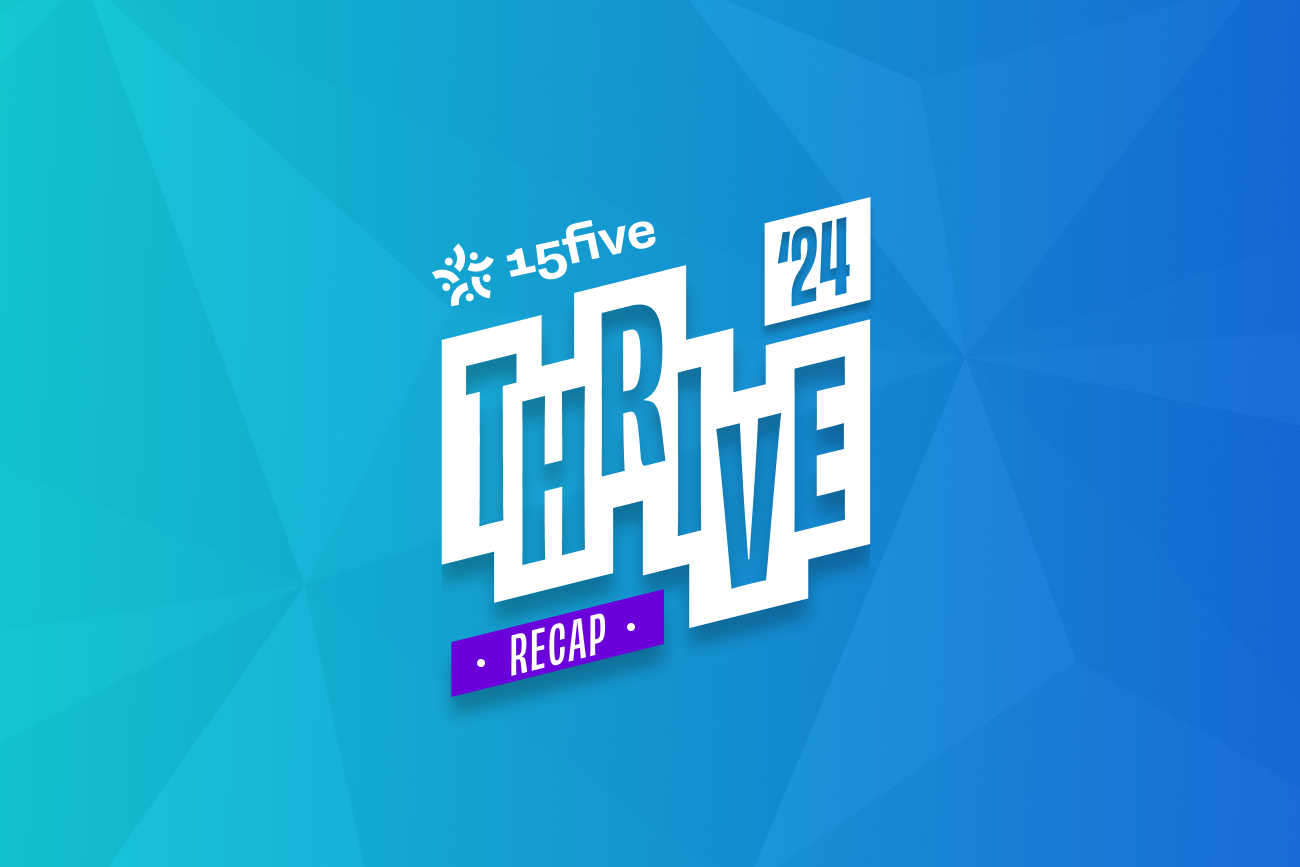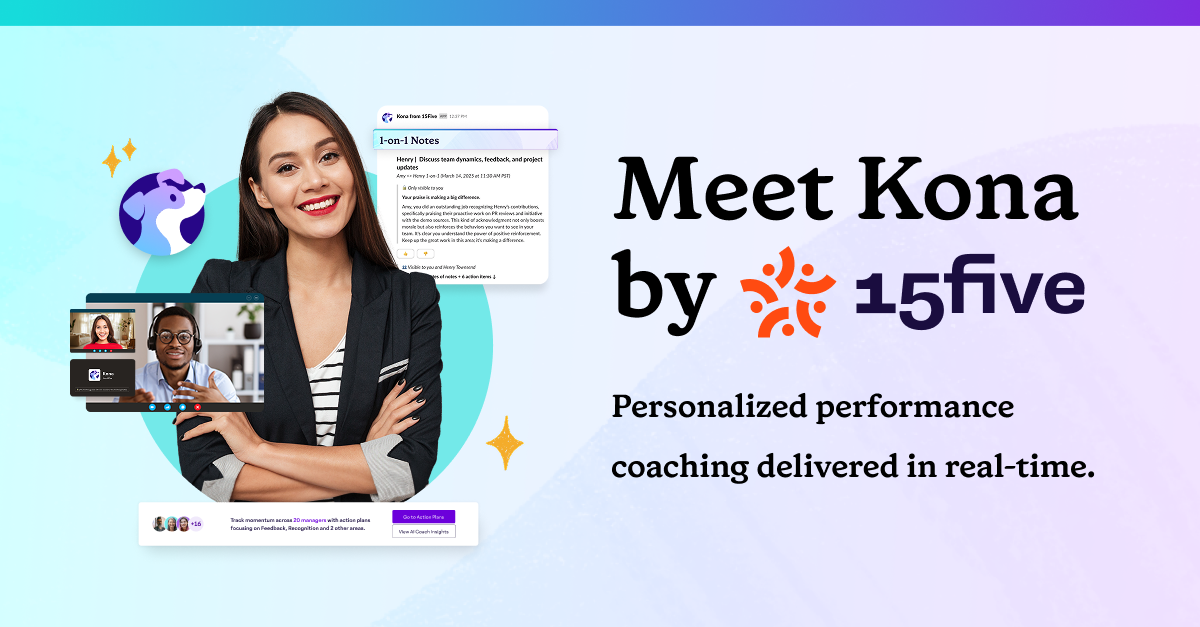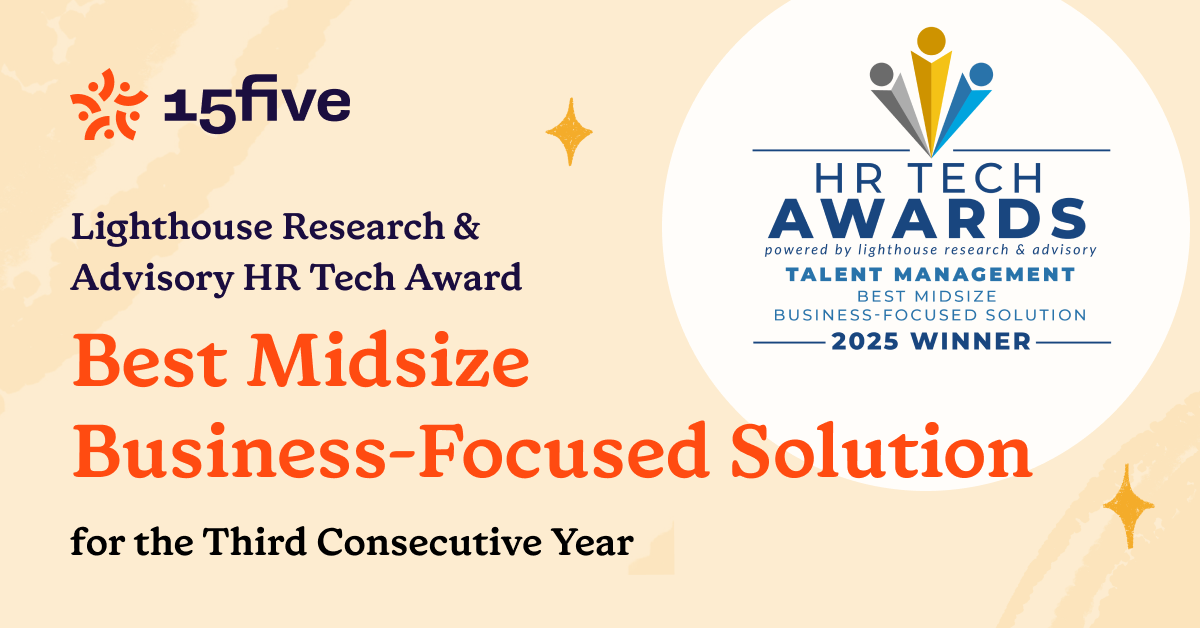The Best Moments from Thrive 2024
Over 1,000 HR leaders, people managers, and industry leaders gathered virtually for Thrive 2024, our biggest event of the year, to explore the future of performance management and strategic HR. This year’s theme, The Predictive Era of Performance Management, sparked conversations about AI, manager enablement, and creating workplaces where people and businesses thrive together.
HR teams are facing increasing pressure to drive measurable business impact while building human-centered workplaces. Thrive gave them a place to explore how leading organizations are achieving both.
Here’s a recap of the most memorable moments from the event.
1. The Rise of Predictive HR
Many HR teams face increasing pressure to tie their work directly to business outcomes while still building human-centered workplaces.
The opening keynote addressed this head-on, with 15Five CEO Jim Morrisroe, Chief Product Officer Jeff Smith, and Staff Data Scientist Dr. Liz Pemberton sharing how predictive analytics now helps HR teams spot potential issues before they impact the bottom line.
“HR leaders today are not just solving problems—they’re predicting them,” Morrisroe said.
Using 15Five’s Predictive Impact Model, Dr. Pemberton showed attendees how HR teams can pinpoint which specific statements most influence engagement scores. HR can shift from firefighting to proactive planning when focusing on these statements.
Smith shared how the Predictive Impact Model helps teams anticipate everything from turnover risks to engagement challenges so that HR can move from reactive firefighting to strategic planning.
Read More: Predictive Impact: The Science Behind 15Five’s AI-powered Predictive Impact Model
Instead of leaving HR teams to figure it out on their own, the model provides clear guidance on where to focus. Dr. Pemberton explained, “If one team struggles with feeling micromanaged, you’ll see that data and know to focus on increasing autonomy in their roles.”
The model answers how much specific statements push a group’s engagement score away from a base level of engagement, helping HR teams understand exactly where to focus their time and resources.
“The goal is progress, not perfection,” Morrisroe noted, reinforcing that even incremental improvements can make a meaningful impact.
These tools help leaders prioritize goals, like reducing turnover or improving team dynamics, with clear benchmarks for success. Sam Harris, Senior Product Manager at 15Five, also emphasized that AI doesn’t have to replace human judgment in engagement surveys.
“Progress, not perfection, is the goal,” Morrisroe said.
2. Making Space for Managers to Lead
With managers stretched thinner than ever, organizations are rethinking how to support these team leaders.
At Thrive 2024, Maya Vasser, Director of Culture and Engagement at Call Rail, talked about the power of data-driven manager enablement. “When we leaned into the data, particularly over this last year, we’ve seen a significant increase in employee satisfaction because we were on the pulse of it a lot sooner, and our managers were very attuned and excited about jumping in and doing the work.”
Stephanie Smith, Chief People Officer at Tagboard, highlighted how trust and clear expectations drive manager success. “We start off with a manager agreement – what are we expecting of our managers, and how are we continuously driving that impact.”
Continuous communication and documented expectations help managers understand how their interactions affect business outcomes.
Watch: Lead Like a Human: Practical Steps to Building Highly Engaged Teams
Vasser emphasized the value of enabling managers with data. “With real-time insights, our managers are more attuned to what matters most to their teams, leading to higher satisfaction and better outcomes,” she said.
3. Building Creative, Safe Spaces at Work
Deanna Marsigliese, Animation Art Director at Pixar, brought a fresh perspective to workplace innovation. Drawing from her work designing characters for Pixar, she explained that creativity flourishes in environments where failure is not feared.
“One of our most successful creative teams came together because they were encouraged to experiment—even if it didn’t work out,” Marsigliese said.
She advised HR leaders to build similar spaces by encouraging collaboration, minimizing judgment, and celebrating new ideas.
4. Moving Beyond Basic DEI
In a time when some companies are questioning their DEI commitments, CEO Risha Grant delivered a powerful keynote that tackled the challenges of advancing diversity, equity, and inclusion. Grant discussed the real barriers companies face, like fear of backlash, tokenism, and failure to follow through on commitments.
“DEI is not a trend,” she said. “It is demonstrably the highest form of humanity in action.”
Diversity initiatives must evolve from performative actions to systemic change. She showed how bias affects workplace decisions and provided concrete steps for creating truly inclusive cultures, which is why organizations must move from being DEI-focused to DEI-infused.
Read More: How To Create a Workplace Culture That Truly Embraces Diversity
She also emphasized the importance of curiosity and accountability. “It starts with asking the hard questions: Where are the gaps? Who’s being excluded? And what’s one step we can take today to address it?”
5. Making the Business Case for People Investment
Former CFO Sayle Hutchison provided practical advice for HR leaders looking to justify investments in people programs. She stressed the importance of understanding metrics and communicating them effectively to finance teams.
Download: The Guide to Balancing High Performance and High Care at Work
“If you want your CFO to support you, know your metrics better than they do,” Hutchison said. She also recommended tying HR initiatives to business challenges, such as using retention strategies to lower turnover costs or engagement programs to boost productivity.
“Your CFO is going to be on a spectrum of whether or not they’re really accountant-minded or whether they’re strategic-minded,” she explained. Leaders can build stronger partnerships and secure resources when they align HR initiatives with the CFO’s perspective.
Looking Forward
Thrive 2024 was our best one yet and highlighted how HR leaders can create workplaces where employees feel empowered, and businesses grow.
As 15Five Lead People Partner Kylie Piper put it, “HR teams are more than a supporting function—we’re the lifeline that people turn to in times of crises, we guide the organization back to stability and strength, and we’re the strategic partners that our leadership teams depend on.”
Missed a session or just want to experience the magic of Thrive 2024 again? Stay tuned for Thrive Encore to watch the sessions on demand.




